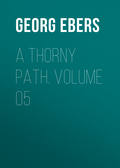
Georg Ebers
The Bride of the Nile. Volume 10
CHAPTER XV
The governor's palace, the pride and glory of Memphis, the magnificent home of the oldest and noblest family of the land—the last house that had given birth to a race of native Egyptians held worthy, even by the Greeks, to represent the emperor and uphold the highest dignity in the world—the very citadel of native life, lay in ashes; and just as a giant of the woods crushes and destroys in its fall many plants of humbler growth, so the burning of the great house destroyed hundreds of smaller dwellings.
This night's work had torn the mast and rudder, and many a plank besides, from that foundering vessel, the town of Memphis. It seemed indeed a miracle that had saved the whole from being reduced to cinders; and for this, next to God's providence, they might thank the black incendiary himself and his Arabs. The crime was committed with cool and shrewd foresight, and carried through to the end. During his visitation throughout the rambling buildings Obada had looked out for spots that might suit his purpose, and two hours after sunset he had lighted fire after fire with his own hand, in secret and undetected. The troops he intended to employ later were waiting under arms at Fostat, and when the fire broke out, first in the treasury and afterwards in three other places in the palace, they were immediately marched across and very judiciously employed.
All that was precious in this ancient home of a wealthy race, was conveyed to a place of safety, even the numerous fine horses in the stables; and the title-deeds of the estate, slaves, and so forth were already secured at Fostat; still, the flames consumed vast quantities of treasures that could never be replaced. Beautiful works of art, manuscripts and books such as were only preserved here, old and splendid plants from every zone, vessels and woven stuffs that had been the delight of connoisseurs—all perished in heaps. But the incendiary regretted none of them, for all possibility of proving how much that was precious had fallen into his hands was buried under their ashes.
The worst that could happen to him now was to be deposed from office for his too audacious proceedings. Of all the towns he had seen in the course of the triumphant incursions of Islam none had attracted him so greatly as Damascus, and he now had the means of spending the latter half of his life there in luxurious enjoyment.
At the same time it was desirable to rescue as much as possible from the flames; for it would have given his enemies a fatal hold upon him, if the famous old city of Memphis should perish by his neglect. And he was a man to give battle to the awful element.
Not another building fell a prey to it on the Nile quay; but a light southerly breeze carried burning fragments to the northwest, and several houses in the poorer quarter on the edge of the desert caught fire. Thither the larger portion of those who could combat the flames and rescue the inhabitants were at once directed; and here, as at the palace, he acted on the principle of sacrificing whatever could not be saved entire. Thus a whole quarter of the town was destroyed, hundreds of beggared families lost all they possessed; and yet he, whose ruthless avarice had cast so many into misery, was admired and lauded; for he was everywhere at once: now by the river and now by the desert, always where the danger was greatest, and where the presence of the leader was most needed. Here he was seen in the very midst of the fire, there he swung the axe with his own hand; now, mounted on horseback, he rode down the line where the dry grass was to be torn up by the roots and soaked with water; now, on foot, he directed the scanty jet from the pipes or, with Herculean strength, flung back into the flames a beam which had fallen beyond the limits he had set. His shrill voice sounded, as his huge height towered, above all others; every eye was fixed on his black face and flashing eyes and teeth, while his example carried away all his followers to imitate it. His shouts of command made the scene of the fire like a battle-field; the Moslems, so ably led, regardless of life as they were and ready to strain and exert their strength to the utmost, wrought wonders in the name of their God and His Prophet.
The Egyptians, too, did their best; but they felt themselves impotent by comparison with what these Arabs did, and they hardly felt anything but the disgrace of being over-mastered by them.
The light shone far across the country; even he whose splendid inheritance was feeding the flames perceived, between midnight and dawn, a glow on the distant western horizon which he was unable to account for.
He had been riding towards it for about half an hour when the caravan halted at the last station but one, on the high road between Kolzum and Babylon.
[Suez, and the Greek citadel near which Amru founded Fostat and Cairo subsequently grew up.]
A considerable troop of horse soldiers dismounted at the same time, but Orion had not summoned these to protect him; on the contrary, he was in their charge and they were taking him, a prisoner, to Fostat. He had quitted the chariot in which he had set out and had been made to mount a dromedary; two horsemen armed to the teeth rode constantly at his side. His fellow-travellers were allowed to remain in their chariot.
At the inn which they had now reached Justinus got out and desired his companion, a pale-faced man who sat sunk into a heap, to do the same; but with a weary shake of the head he declined to move.
"Are you in pain, Narses?" asked Justinus affectionately, and Narses briefly replied in a husky voice: "All over," and settled himself against the cushion at the back of the chariot. He even refused the refreshments brought out to him by the Senator's servant and interpreter. He seemed sunk in apathy and to crave nothing but peace.
This was the senator's nephew.
With Orion's help, and armed with letters of protection and recommendation from Amru, the senator had gained his purpose. He had ransomed Narses, but not before the wretched man had toiled for some time as a prisoner, first at the canal on the line of the old one constructed by the Pharaohs, which was being restored under the Khaliff Omar, to secure the speediest way of transporting grain from Egypt to Arabia and afterwards in the rock-bound harbor of Aila. On the burning shores of the Red Sea, under the fearful sun of those latitudes, Narses was condemned to drag blocks of stone; many days had elapsed before his uncle could trace him—and in what a state did Justinus find him at last!
A week before he could reach him, the ex-officer of cavalry had laid himself down in the wretched sheds for the sick provided for the laborers; his back still bore the scars of the blows by which the overseer had spurred the waning strength of his exhausted and suffering victim. The fine young soldier was a wreck, broken alike in heart and body and sunk in melancholy. Justinus had hoped to take him home jubilant to Martina, and he had only this ruin to show her, doomed to the grave.
The senator was glad, nevertheless, to have saved this much at any rate. The sight of the sufferer touched him deeply, and the less Narses would take or give, the more thankful was Justinus when he gave the faintest sign of reviving interest.
In the course of this journey by land and water—and latterly as sharing the senator's care of his nephew—Orion had become very dear to his old friend; and at the risk of incurring his displeasure he had even confessed the reasons that had prompted him to leave Memphis.
He never could cease to feel that everything good or lofty in himself was Paula's alone; that her love ennobled and strengthened him; that to desert her was to abandon himself. His trifling with Heliodora could but divert him from the high aim he had set before himself. This aim he kept constantly in view; his spirit hungered for peaceful days in which he might act on the resolution he had formed in church and fulfil the task set before him by the Arab governor.
The knowledge that he had inherited an enormous fortune now afforded him no joy, for he was forced to confess to himself that but for this superabundant wealth he might have been a very different man; and more than once a vehement wish came over him to fling away all his possessions and wrestle for peace of mind and the esteem of the best men by his own unaided powers.
The senator had taken his confession as it was meant: if Thomas' daughter was indeed what Orion described her there could be but small hope for his beautiful favorite. He and Martina must e'en make their way home again with two adopted dear ones, and it must be the care of the old folks to comfort the young ones instead of the young succoring the old as was natural. And in spite of everything Orion had won on his affections, for every day, every hour he was struck by some new quality, some greater trait than he had looked for in the young man.
Torches were flaring in the inn-yard where, under a palm-thatched roof supported on poles and covering a square space in the middle, benches stood for the guests to rest. Here Justinus and Orion again met for a few minutes' conversation.
His warders were also seated near them; they did not let Orion out of their sight even while they ate their meal of mutton, bread, onions, and dates. The senator's servants brought some food from the chariot, and just as Justinus and Orion had begun their attack on it, a tall man came into the yard and made his way to the benches. This was Philippus, pausing on his road to Djidda. He had learnt, even before coming in, whom he would find here, a prisoner; and the Arabs, to whom the leech was known, allowed him to join the pair, though at the same time they came a little nearer, and their leader understood Greek.
Philippus was anything rather than cordially disposed towards Orion; still, he knew what peril hung over the youth, and how sad a loss he had suffered. His conscience bid him do all he could to prove helpful in the trial that awaited him in the matter of the expedition in which Rufinus had perished. He was the bearer, too, of sad news which the Arabs must necessarily hear. Orion was indeed furious when he heard of the seizure and occupation of the governor's residence; still, he believed that Amru would insist on restitution; but on hearing of his mother's death he broke down completely. Even the Arabs, seeing the strong man shaken with sobs and learning the cause of his grief, respectfully withdrew; for the anguish of a son at the loss of his mother was sacred in their eyes. They regard the man who mourns for one he loves as stricken by the hand of the Almighty and hallowed by his touch and treat him with the reverence of pious awe.
Orion had not observed their absence, but Philippus at once took advantage of it to tell him, as briefly as possible, all that related to the escape of the nuns. He himself knew not yet of the burning of the palace, or of Paula's imprisonment; but he could tell the senator where he would find his wife and niece. So by the time he was bidden to mount and start once more Orion was informed of all that had happened.
It was with a drooping head, and sunk in melancholy thought that he rode on his way.
As for the residence!—whether the Arabs gave it back to him or not, what did he care?—but his mother, his mother! All she had been to him from his earliest years rose before his mind; in the deep woe of this parting he forgot the imminent danger and the dungeon that awaited him, and the intolerable insult to his rights; nay, even the image of the woman he loved paled by the side of that of the beloved dead. Perhaps he might not even gain permission to bury her!
The way lay through a parched tract of rocky desert, and the further they went the more intense was that wonderful flush in the west, till day broke behind the travellers and the glory of the sunrise quenched the vividness of its glow.
Another scorching day! The rocks by the wayside still threw long shadows on the sandy desert-road, when a party of Arab horsemen came from Fostat to meet the travellers, shouting the latest news to the prisoner's escort. It was evidently important; but Orion did not understand a word of what they said. Evil tidings fly fast, however; while the men were talking together, the dragoman rode up to him and told him that his home was burnt to the ground and half Memphis still in flames. Then came other newsbearers, on horseback and on dromedaries; and they met chariots and files of camels loaded with corn and Egyptian merchandise; and each and all shouted to the Arab escort reports of what was going on in Memphis, hoping to be the first to tell the homeward bound party.
How many times did Orion hear the story—and each time that a traveller began with: "Have you heard?" pointing westward, the wounds the first news had inflicted bled anew.
What lay beneath that mass of ashes? How much had the flames consumed that never could be replaced! Much that he had silently wished were possible had in fact been fulfilled—and so soon! Where now was the burthen of great wealth which had hung about his heels and hindered his running freely? And yet he did not, even now, feel free; the way was not yet open before him; he secretly mourned over the ruined house of his fathers and the wrecked home; a miserable sense of insecurity weighed him down. No father—no mother-no parental roof! For years he had been, in fact, perfectly independent, and yet he felt now like a pilot whose boat had lost its rudder.
Before him lay a prison, and the closing act of the great tragedy of which he himself had been the hero. Fate had fallen on his house, had marked it for destruction as erewhile that of Tantalus. It lay in ashes, and the victims were already many: two brothers, father, mother—and, far away from home, Rufinus too.
But whose was the guilt?
It was not his ancestors who had sinned; it could only be his own that had called down this ruin. But was there then such a power as the Destiny of the ancients—inexorable, iron Fate? Had he not repented and suffered, been reconciled to his Redeemer, and prepared himself to fight the hard fight? Perhaps he was indeed to be the hero of a tragedy; then he would show that it was not the blind Inevitable, but what a man can make of himself, and what he can do by the aid of the God of might, which determines his fate. If he must still succumb, it should only be after a valiant struggle and defense. He would battle fearlessly against every foe, would press onward in the path he had laid down for himself. His heart beat high once more; he felt as though he could see his father's example as a guiding star in the sky, so that he must be true to that whether to live or to die. And when he turned his eye earthwards again, still, even there, he had that which made it seem worth the cost of enduring the pangs of living and the brunt of the hardest battle: Paula and her love.
The nearer he approached Fostat, the more ardently his heart swelled with longing. Heaven must grant him to see her once more, once more to clasp her in his arms, before—the end!
It seemed to him that what he had gone through in these few hours must have removed and set aside everything that could part them. Now, he felt, he had strength to remain worthy of her; if Heliodora were to come in his way again he would now certainly, positively, regard and treat her only as a sister.
He was conducted at once to the house of the Kadi; but this official was at the Divan—the council, which his arch-foe, that black monster Obada, had called together.
After the labors of the past night the Negro had allowed himself only a few hours rest, and then had met the council, where he had not been slow to discover that he had as many enemies as there were members present.
His most determined opponents were the Kadi Othman, the head of the Courts of justice and administration, and Khalid the governor of the exchequer. Neither of them hesitated to express his opinion; and indeed, no one present at this meeting would have suspected for a moment that most of the members had, in their peaceful youth, guarded flocks as shepherds on the mountains, led caravans across the desert, or managed some small trade. In the contests of tribe against tribe they had found opportunities for practice in the use of weapons, and for steeling their courage; but where had they learnt to choose their words with so much care, and emphasize them with gestures of such natural grace that any Greek orator would have admired them? It was only when the indignant orator "thundered and lightened" and was carried away by the heat of passion that he forgot his dignified moderation, and then how grandly voice, eye, and action helped each other! And never, even under the highest excitement, was purity of language overlooked. These men, of whom very few could read and write, had at their command all the most effective verses of their poets having thousands of lines stored in their minds.






